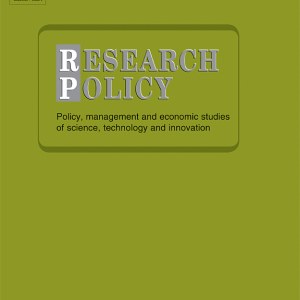
Hoogendoorn, B., \Van der Zwan\, P. and Thurik, R. (2020). Goal heterogeneity at start-up: are greener start-ups more innovative? Research Policy, 49(10):0--17.
-
Affiliated authorsSander Hoogendoorn, Roy Thurik
-
Publication year2020
-
JournalResearch Policy
Start-ups differ in the extent to which they introduce innovations to markets and, hence, in their potential contribution to society. Understanding the heterogeneous character of start-ups is key to explaining the variability in innovation. In this study, we explore whether start-ups that place more emphasis on environmental value creation versus economic value creation ({\textquoteleft}greener start-ups{\textquoteright}) are more innovative. We also examine how environmental regulations at the country level affect this relationship. We theorize that the fundamental difference between economic value creation (private wealth generation, i.e., self-regarding interest) and environmental value creation (environmental gains for society, i.e., other-regarding interest) influences entrepreneurial opportunity identification and exploitation. When considering the regulatory context, we draw on the innovation inducement effect of environmental regulations and expect these regulations to be most effective for entrepreneurs with a strong emphasis on economic value creation. Performing multi-level ordered logit regressions r with 2,945 start-up entrepreneurs in 31 countries (Global Entrepreneurship Monitor data), we find that {\textquoteleft}greener start-ups{\textquoteright} are more likely to engage in product and process innovations. We find some evidence of a positive moderation effect for environmental regulations. We advance research on innovative entrepreneurship by theorizing and finding evidence that other-regarding goals are relevant in explaining start-up innovativeness.